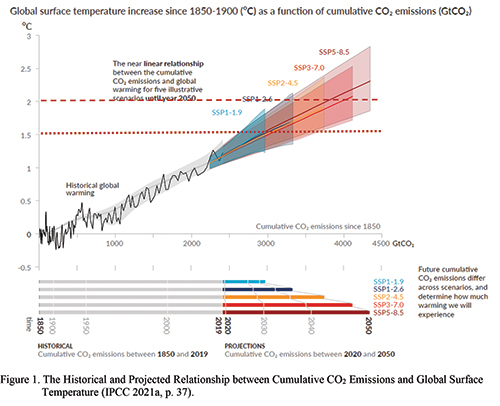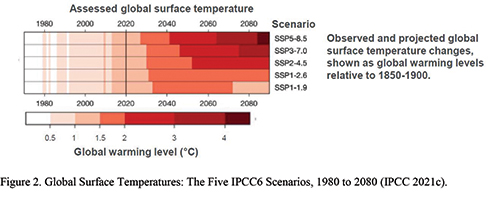
WILLIAM RAU
The United Nations’ Intergovernmental Panel on Climate Change (IPCC) assembles top climate scientists to report to policymakers, which is the purpose of their “grimdark” 6th report, IPCC6. IPCC scientists are known for rectitude and constrained predictions due to consensus decision making and adherence to scientific protocols. Better data and methods, however, and the magnitude of climate disasters sweeping the world, lead to extreme words to fit unfolding climate extremes: “unequivocal,” “unprecedented,” “compounding events,” and “irreversible,” or “permanent changes.” The result of only a 1.1° Celsius (2.0°F) temperature increase! With danger growing, IPCC6 urges “immediate, rapid, and sustained reductions in greenhouse gases.”

Figure 1 frames the big issue. Five scenarios, from the lowest to the highest CO2 emissions, are mapped onto global temperature increases. What’s crucial? To achieve a 67% probability of limiting the future temperature increase to 1.5° Celsius, we must also limit future emissions to 400 gigatons of CO2. At our current emissions rate of 40 gigatons CO2 per year (FAQ, p.122), and with 80 billion debited for 2020 and 2021, we exhaust our remaining 1.5° Celsius carbon budget by 2030. A 3° Celsius (5.4°F) increase by 2100 results if we persist with a 40-gigaton emission rate.
Next, there’s “irreversibility.” Ocean-captured heat and surface glacial melt yield “virtually certain” global sea level rise across the rest of the 21st century. Moreover, sea levels “will continue to rise for centuries to millennia.” We cannot reverse at least 1.4 feet of sea level rise by 2100 – and that’s for the lowest emissions scenario – nor prevent ongoing rises in the 22nd century. These are locked in. More delay will lock in other tipping points
Hope of achieving climate stability by 2100 requires immediate action to reduce CO2 emissions 50% by 2030. How are we doing? Pathetically trivial commitments: a 1% reduction by 2030, 1/50th of required reductions. Fatalism is the worst possible response to such blinkered buck passing, however, because rapid reductions in emissions would stabilize and then reduce global surface temperatures. We would not see discernable changes before 2050, but eventually temperatures would begin to decline very slowly (Fig. 2). In short, we can still prevent runaway climate change.

We can’t fob this off solely on government because: (1) we are a major part of the problem; (2) full government commitment would prove insufficient. Climate change is not a like moonshot to be turned over exclusively to NASA. It requires WWII-like mobilization where all citizens rise to the cause. Do you drive a gasmobile? New hybrids reach up to 60mpg. Have a home? Its probably bleeding conditioned air like crazy. You can plug leaks, add insulation, slaughter energy hogs, reduce energy use by 50%, and save money. Cut your lawn? Scrap the gas mower, go electric. The list goes on and on. Start somewhere!
Let’s kickstart the change we want by decarbonizing our own lives. Sometimes there’s advantage when governments must follow citizen leaders, especially young ones. “No one,” Greta Thunberg argues, “is too small to make a difference.” Working with our kids we have a chance of turning ‘grimdark’ into ‘hopepunk’.
References
Johnson, Scott K. 2021 (Aug 9). You can’t plead with physics — New IPCC climate report is the clearest guidebook for selecting a future. Ars Technica; https://arstechnica.com/science/2021/08/new-ipcc-climate-report-is-the-clearest-guidebook-for-selecting-a-future/
IPCC. 2021a (Aug 8). Summary for Policy Makers (SPM). In: Climate Change 2021; https://www.ipcc.ch/report/ar6/wg1/#SPM
2021b (Aug 8). Frequently Asked Questions; https://www.ipcc.ch/report/ar6/wg1/#FAQ
2021c (Aug 8). Regional Fact Sheet–Introduction (FCI); https://www.ipcc.ch/report/ar6/wg1/#Regional
Romano, Aja. 2018 (Dec 27). Hopepunk, the latest storytelling trend, is all about weaponized optimism. Vox; https://www.vox.com/2018/12/27/18137571/what-is-hopepunk-noblebright-grimdark
Root, Tik. 2021 (Aug 10). Five key excerpts from the United Nations’ climate change report. Washington Post; https://www.washingtonpost.com/climate-environment/2021/08/10/ipcc-report-un-takeaways/
Thunberg, Greta. 2019. No One is Too Small to Make a Difference. UK: Penguin Books.

Recent Comments